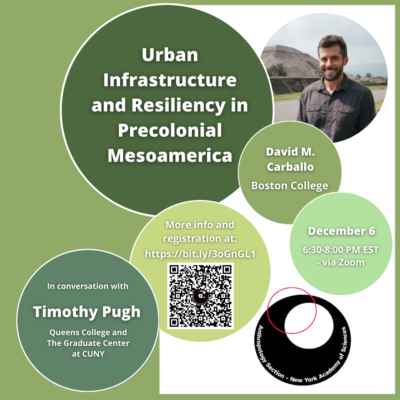NYAS Lecture 12/6: Urban Infrastructure and Resiliency in Precolonial Mesoamerica
General
Mark your calendar for December 6th, 6:30 PM, EST, for the next installment of the New York Academy of Sciences Distinguished Lecture Series. Dr. David M. Carballo will be presenting, “Urban Infrastructure and Resiliency in Precolonial Mesoamerica”. Dr. Timothy Pugh will act as discussant.
To register for this Zoom event click here. This event will also be livestreamed on YoutTube.
As debates continue, in the contemporary US and elsewhere, about what constitutes infrastructure and the amount of resources to invest in it, what lessons might we glean from a deep historical approach to the archaeology of cities? In this talk I combine recent investigations at the pre-Aztec capital of Teotihuacan, Mexico—the largest city in the Americas of its day—with a comparative perspective to contextualize variability in urban organization, Indigenous social institutions, and the role of infrastructure in the resilience of cities in precolonial Mesoamerica. I argue that, although these premodern, non-Western cities were different in significant ways from our own, they provide meaningful points of comparison for considering the broad contours of how infrastructure at level of urban epicenters, neighborhoods, and households contributes to the variability in social relations, size, and longevity of cities we observe in the archaeological record.
Featured Speaker
David M. Carballo is Professor of Anthropology, Archaeology, and Latin American Studies at Boston University, where he is also Associate Provost for General Education. He specializes in the archaeology of Latin America, especially the Native peoples of central Mexico and with topical interests in households, urbanism, religion, collective action, and working with contemporary communities in understanding ancient ones. Current investigations focus on Teotihuacan’s Tlajinga district, a cluster of non-elite neighborhoods on the periphery of what was then the largest city in the Americas.
He received his BA in Political Science from Colgate University (1995) and his MA (2001) and PhD (2005) in Anthropology from UCLA. Recent books include Cooperation and Collective Action: Archaeological Perspectives (ed., 2013), Urbanization and Religion in Ancient Central Mexico (2016), Teotihuacan: The World Beyond the City (ed., 2020), and Collision of Worlds: A Deep History of the Fall of Aztec Mexico and the Forging of New Spain (2020).
Discussant
Timothy Pugh is Professor of Anthropology at Queens College and The Graduate Center of the City University of New York. His archaeological research, which is funded by the National Science Foundation, focuses upon the Maya of Petén, Guatemala. His work revealed that the ancient Maya planned and built a gridded city at Nixtun-Ch’ich’ during the Middle Preclassic period (800-300 BCE). Based upon intensive investment in public works, the occupants appear to have had a much more cooperative system of governance.
